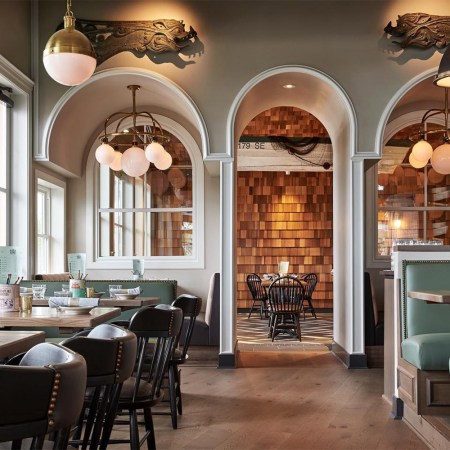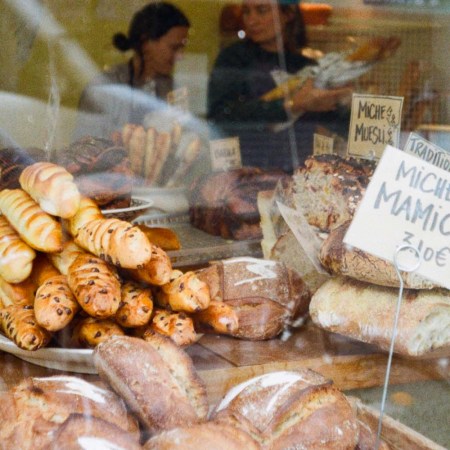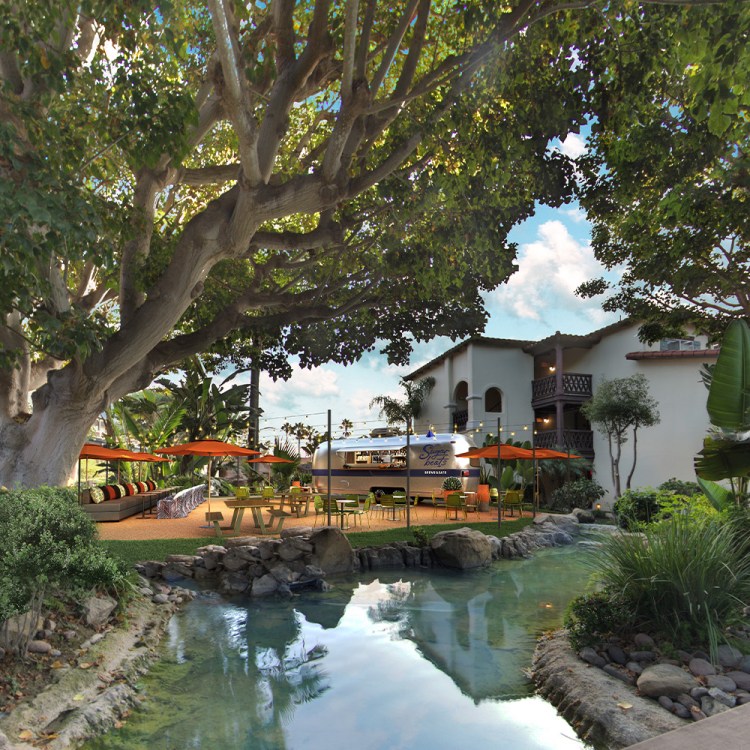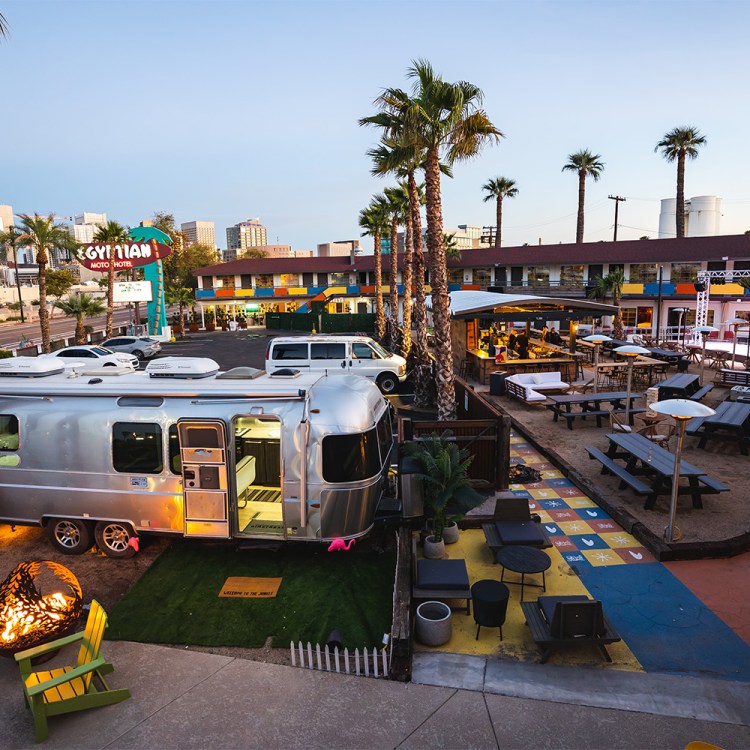In honor of all of the restaurants we dearly miss and can’t wait to get back to, we’re asking some of the country’s most decorated chefs to tell us about the meals that will be at the top of their list when Stay at Home orders finally lift. This is First Meal Back.
“I always say to be in this business, you have to be a little nuts,” says Chef Ray Garcia, the toque behind Broken Spanish. “Usually, it’s a controlled chaos, but now, it’s sort of this Groundhog’s Day that we’re stuck in. It’s made for quite the pressure-cooker of an environment, no pun intended.”
Broken Spanish serves some of the most inventive Hispanically influenced cuisine in Los Angeles. Since the lockdown, the convivial downtown restaurant has adapted to a delivery and takeout format three nights a week that consists of prepared dinners with dishes like tamales, chicharrones and batched cocktails. You order it online and finish it off in your own oven to ensure a fresher experience.
As part of our series First Meal Back, we connected with Garcia to find out what he’s been up to during the lockdown and where he’s hoping to eat once restrictions are lifted.
InsideHook: Where are you most looking forward to having a meal again?
Ray Garcia: When all this happened, I felt like the week was just caught right in the middle and somebody hit pause. There were some things that I had on my list that I wasn’t able to accomplish that week, among which is a carniceria in East LA called Los Cinco Puntos. I had gone there the week before we had closed down — I didn’t realize that it was a Wednesday, and they were closed on a Wednesday. I was like, “Oh, I’ll just come back next week.” It’s still stuck in my mind, so I have to get back there and check that box.
Los Cinco Puntos has been around forever, or at least in my version of forever. I’m an LA native, born and raised, 43 years here. It was a place that I remember going to with my dad as a kid. There is a bit of nostalgia to it. But now, revisiting as a chef, or even anybody who appreciates food, what they do there is really kind of amazing. It’s very soulful. It is sort of a market/Mexican butcher, but they have these ladies who are hand-pressing the tortillas, not even using a metal press, but just hand-pressing tortillas and throwing them on this giant griddle that’s been there since the beginning of time. They have corn cooking for their masa that they grind on their own. You step up to the counter and you pick your cut of meat: they have tripe, they have ears, they have tongue, they have chicharrón, they have belly, they have carnitas. They have all these different things. So when you walk up and you pick it, they just chop it up right in front of you, put it on this fresh tortilla that was just made, a few sauces over the top, whichever you choose. It’s delicious. It’s just this perfect bite, at least in my mind, of a tortilla that’s generally too thick for how I would like to eat it or how I would make it, but it just sort of makes sense when the whole thing comes together.
Where are you looking to go for a drink once things get cranked back up?
That’s assuming I haven’t been doing a lot of drinking lately! But anywhere other than my couch, please. Old Lightning: I want to go back. Again, it was, oddly enough, some place I’d been recently. And I was just reminded of how special the experience is there. If you’ve never been, it’s kind of like a speakeasy (hidden in the back of Scopa). They specialize in very rare liquors, among other things. They still do great cocktails, but you go in and tell them what you like to drink. If it’s whisky, do you prefer Scotch whisky, Irish whiskey, American bourbon? Whatever that might be, you give them a price range and they bring out three to four incredible bottles and pour you a shot and talk to you about it. It’s pretty geeky for most, so you have to be really into that experience. I love sitting down and that sort of storytelling of everything that went into making each individual bottle and what made it different from the last drink I had. They take your cell phone, which is awesome. Because nowadays, you’re so connected to your phone. And I’m like, “Oh, wow. I don’t have a cell phone and I’m drinking a bunch of liquor. It’s like Mad Men.”
What have you been cooking and eating at home?
I’ve been using the Instant Pot a lot. That’s not a paid advertisement. I just think it’s because I haven’t been at home that much. I’ve been at work probably just as much if not more than normal, just trying to keep this place afloat. So I’m doing a lot of meal preparation, because my family’s at home. I’ll have four pieces of equipment working at the same time, and I’ll be making a chicken in the toaster oven. I’ll have some beans going in the InstaPot. I’ll be cleaning some greens in the sink and soaking some overnight oats so that everything is like, “Okay, you guys have breakfast, lunch, dinner ready to go.” And then working with my son, who’s six, to get him to be a bit more, I won’t say self-sufficient, but just get him more familiar in the kitchen. He scrambles his own eggs. He helps me make him pancakes and cuts his own fruit, and knows how to make his own beans, which are his favorite food out there. So, we’ve just been doing a lot of that at home.
The other thing we’ve been doing to support local farmers, and our industry, is CSA boxes. It is sort of like a mystery box because some of these ingredients, I never, ever use … like sesame leaves. But I have sesame leaves. Let me figure out what to do with them, or ramps, or whatever it is that is in that box. So, that’s a fun twist of figuring out what to do with it, and exposing myself and my family to new ingredients we wouldn’t normally cook at home.
What constitutes the perfect tamale, in your opinion?
Tamales are something that I always grew up with. And it’s the reason why they’ve been on the menu … well, there’s a couple reasons why they’ve been on the menu since day one. One is because they’re familiar, at least for me, with the Mexican or Mexican-American experience, so it’s a way to connect with diners, because most people who come in have at least heard of a tamale. But the other reason is because it’s kind of to correct some of those sort of pet peeves that I have with some tamales. I don’t know if we make the perfect tamale, but it’s something that we strive for, in that we have enough filling in the inside. Because a lot of times, when you buy a tamale, it’s like, “Oh, this thing is massive,” and then there’s just one little lump of meat or cheese or something right in the center. I think the perfect tamale should have a consistent amount of filling all the way through. The other thing is with the rolling or the folding of the leaf. A lot of times, you get it and they’re just sort of pieced together so when you unwrap your tamale, the whole thing has fallen apart because the leaves are folded into the center of the tamale. We try to have as clean and pristine of a look on the tamale as we can.
What’s been your favorite item from your pantry?
I would say beans. We buy them dry. I’m not soaking them overnight. I know that’s controversial, but yeah, we don’t soak them overnight. At the restaurant, we have these traditional clay bean pots. We cook them with just the water, the beans; depending on what flavor we’re going for, a little onion, serrano and either avocado leaf or some sort of leaf to perfume them. We cook them slow, for probably about 45 minutes. At home, I do it much easier. It’s just beans, water, InstaPot, put on the lid and hit the bean button, and they come out shockingly good. Then I take them and, most of the time, make refried beans. That’s my son’s jam right there. Plus, we get to mash the beans. That’s a fun project for father and son, is pounding some beans with a bean masher.
How do you think the restaurant industry will change after all this passes, or at least some sense of normalcy returns?
I think it’s going to be tough, to say the least. I think to say that there will be a new normal is underselling how bad it’s going to be for a lot of people for a good amount of time. I think we will come back. People need to eat. They need to go to restaurants. But it’s not sort of like a light switch that just comes back on. It’s probably more of a light on a dimmer, and it’ll slowly get brighter and brighter.
But for a lot of us, speaking on the operator end, there are some really big challenges — the biggest of which are the unknowns, which I think are going to make it really tough for a lot of our favorite restaurants to be able to come back in the way that we appreciated them before the pandemic. There’s so many factors that go into it: your rent or your relationship with the landlord, your ability to pivot and turn your concept into something that is maybe available for takeout and delivery as well as dine-in. What’s in the diner’s mindset, the diner’s psyche? And how many people are going to be rushing to come into a restaurant and dine with strangers, especially after two months of doing your best to avoid any sort of contact with anybody?
Even if we can now seat 30% of what we used to, we still have to have people who are engaged and want to come out and dine. We have to retrain our staff. We have to make staffing adjustments based on business levels. There’s a lot of things that go into trying to figure out how to survive, and that’s going to look different for everybody. There’s some restaurants that were already built that way before this, so they had huge takeout, delivery, online presence — everything. Those will probably be the ones that have the easiest time transitioning into this new world. I think for the more classic restaurants — these really fun places that everyone loves to pack into, where there’s an hour wait or a month wait to get a reservation, and when you get in there, you’re packed in the bar and packed in the dining room, the tables are turning fast — all of those aren’t going to be an option when we reopen. That is definitely going to change the business side of the equation for us, and it’s definitely going to change the experience for everybody, with sort of a lag of when we’re going to be able to get back to what we remember: standing next to somebody at the bar and having a seat and overhearing the conversation next to you. I think all of that is going to be tricky. As operators, we’re going to have to navigate and sort of mediate a lot of people’s opinions and fears, including our own. We want to keep ourselves healthy, our staff healthy. There’s just so much out there that we don’t know yet.
How optimistic are you about the future of Los Angeles in general?
I have faith in L.A. and the operators and the people. I see nothing but a heightened level of flexibility and support and understanding, and all these things that are not exactly synonymous with the L.A. diner or dining culture: patience and everything else. Not a ton of gluten allergies happening right now. It’s just like, “Okay, we’re flexible. We got this.” So yeah, so we’ll see. I’m cautiously optimistic. I’m hopeful that everyone will come together to do whatever it takes to preserve the L.A. food culture and scene, and I think that’s from operators to guests to landlords to the city itself.
Over the last five years, L.A. has become arguably one of the best cities in America. I don’t think that L.A. is ready to hand that back and say, “Okay, we’re done. We fold.” I think that we worked hard to get there. We got here because we’re different. We got here because we’re diverse. We got here because we’re creative, and we got here because we support one another. I think that kind of spirit that got L.A. to the point where it is today is what’s going to help us recreate or map out the new landscape of the culinary scene.
This article was featured in the InsideHook LA newsletter. Sign up now for more from the Southland.






















